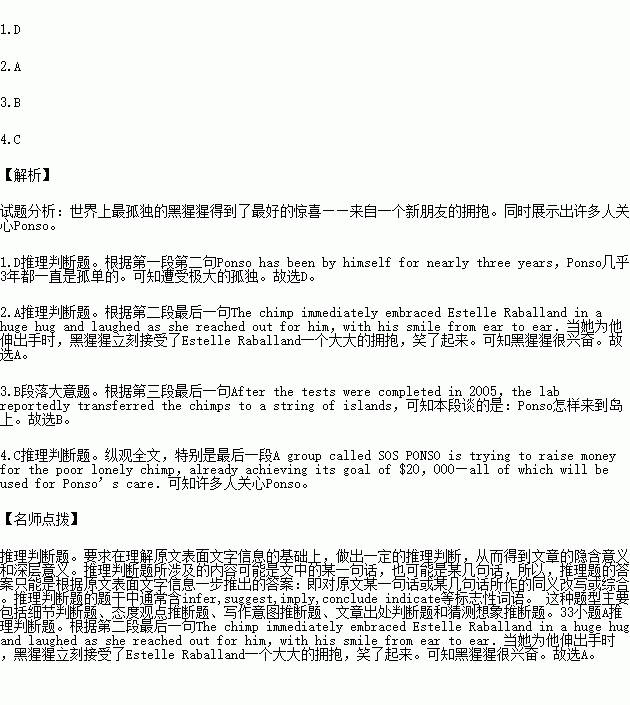题目内容
The loneliest chimp(黑猩猩)in the world just got the best surprise—a hug from a new friend.Ponso has been by himself for nearly three years,finding himself alone after his wife and children died on the island where they were abandoned by a medical testing company many years ago.
For years a nearby villager named Germain has been Ponso’s only company,visiting him so often to bring bananas and bread—the chimp’s only source of food on the tiny island.It was clear how much Ponso missed companionship when he was recently visited by Chimpanzee Conservation Centre Director Estelle Raballand.The chimp immediately embraced Estelle Raballand in a huge hug and laughed as she reached out for him,with his smile from ear to ear.
For those who know Ponso’s backstory,his immediate ease and trust in humans might be surprising.Ponso was one of 20 chimps,all between the ages of 7 to 11 years old,relocated to an island off the Ivory Coast after being used for testing by the New York Blood Centre.After the tests were completed in 2005,the lab reportedly transferred the chimps to a string of islands,occasionally dropping off food and water because there was none in the chimps’ new homes.
Disease and hunger soon left only Ponso,his mate and their two children standing.But at the end of 2013 they died within days of each other and Ponso was now completely alone.
A group called SOS PONSO is trying to raise money for the poor lonely chimp,already achieving its goal of $20,000—all of which will be used for Ponso’s care.
1.What do we know about the chimp Ponso?
A.He was deserted by his family.
B.He found many sources of food.
C.He came to the island for a test.
D.He suffers from loneliness greatly.
2.How did Ponso feel about the visit of Estelle Raballand?
A.Excited. B.Frightened.
C.Embarrassed. D.Confused.
3.What is Paragraph 3 mainly about?
A.The chimps’ new settlement.
B.How Ponso came to the island.
C.Why Ponso was used for a test.
D.The medical test about chimps.
4.What can be inferred from the text?
A.Germain won’t visit Ponso any more.
B.A new lab will be built on the island.
C.Many people show concern for Ponso.
D.More chimps will be brought to the island.
 天天向上一本好卷系列答案
天天向上一本好卷系列答案 小学生10分钟应用题系列答案
小学生10分钟应用题系列答案
